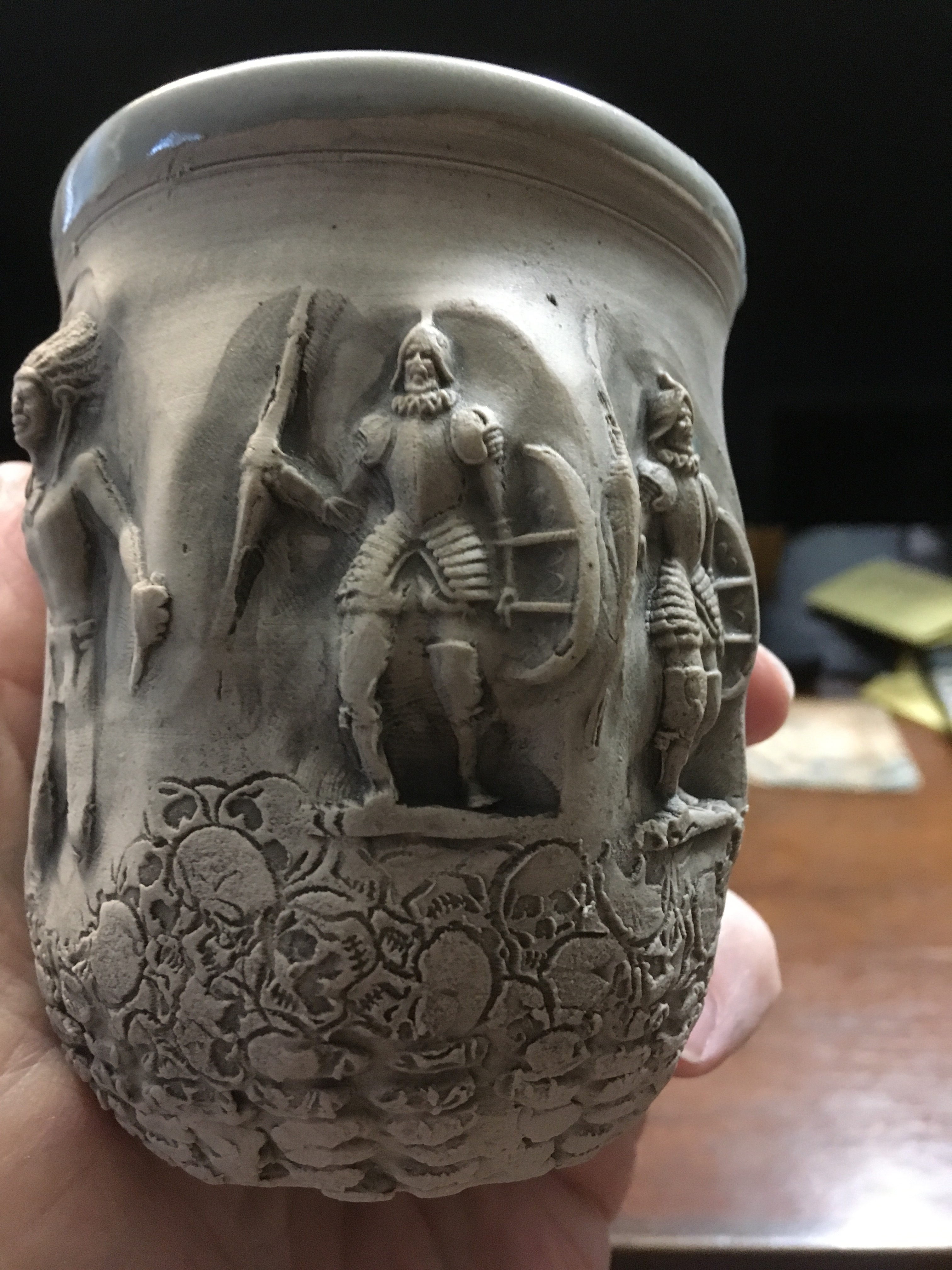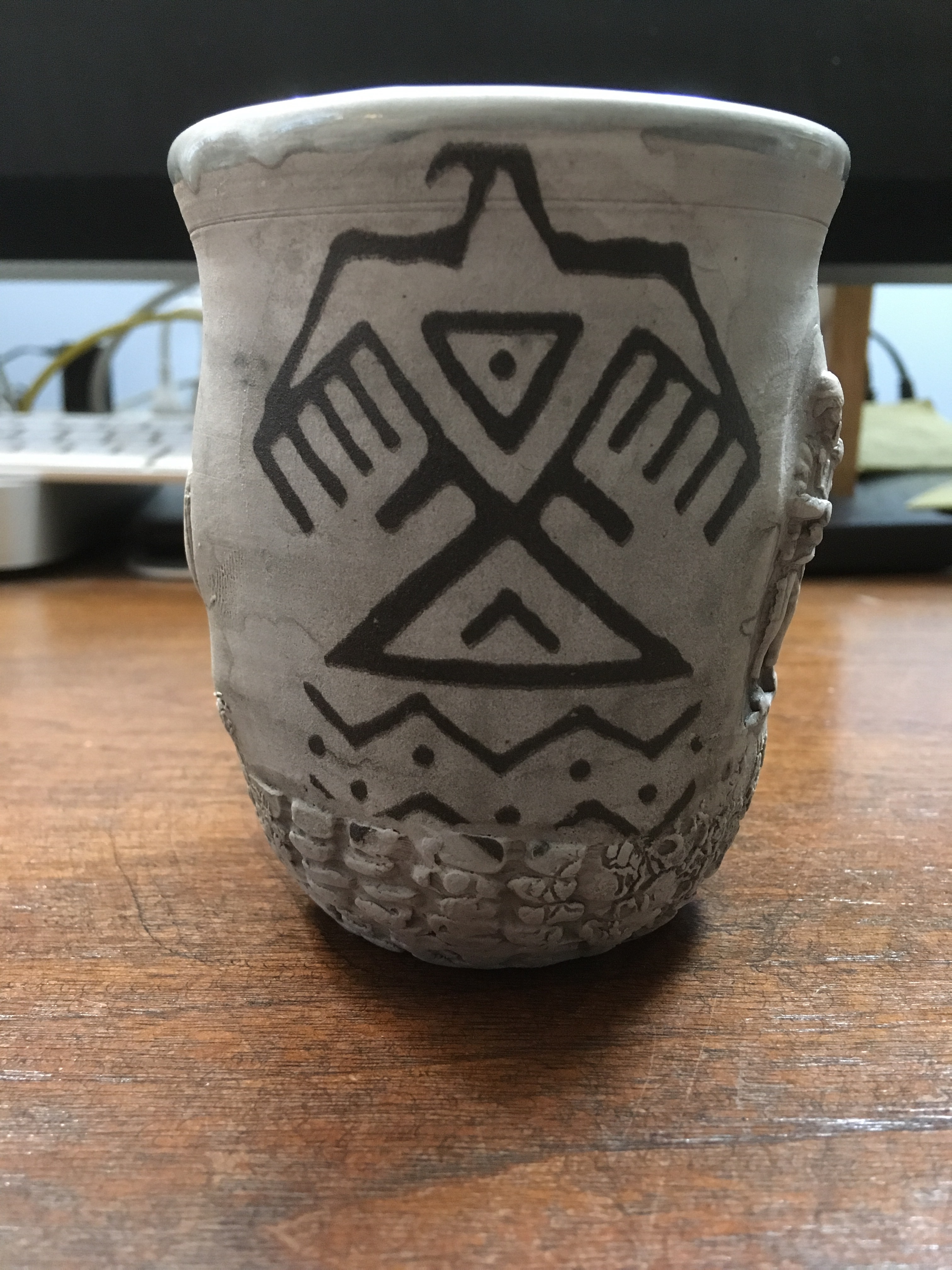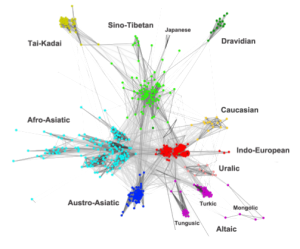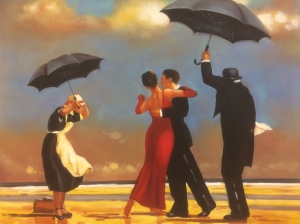
Have you ever encountered a movie star or television personality in the real world—in the flesh? Such encounters used to be relatively common in Southern California, in the 60’s and early 70’s—and maybe they still are, given the pictures posted in People magazine or Star, in which you can study various famous people caught shopping without their make-up on, or wearing their bikini’s and gym shorts at the beach. In my experience, on occasion during the summer, you might encounter sundry movie personalities, such as Arnold Schwarzenegger lifting weights on Muscle Beach, or John Wayne among the yachts in Newport Harbor (I once tossed him up a beer to the deck of his giant schooner from my tiny sunfish—which he caught one-handed. He was pretty good.).
A more reliable strategy had people attending Hollywood funerals of someone in the Industry—to which other stars might flock to pay respects, and to display loyalty to the studio at which they hoped to make their next movie. The common, non-famous people were kept a discreet distance away by police tape, but we’d all be out there taking notes in little black books the way serious bird watchers tally the different species they have seen. Instead of Water Birds, or Raptors, we might have Action Heroes, Villains, Romantic Leads, Female Cops—or a newly recognized species, Sexual Predators.
I was dragged along to a couple of these funerals by the mother of a friend of my-then-girlfriend, where I was surprised to discover that none of the movie stars looked like themselves. I never would have recognized Angie Dickinson, for instance, if Robbie’s mother hadn’t loudly pointed her out. For one thing, she was emaciated, which on television looks more appealing than in life at a funeral. Jimmy Stewart I might have guessed, but only because of the context: I was expecting to see someone famous, and here was a tall, nondescript, skinny guy in a suit. He resembled my grandfather on a Sunday. The moral was, everybody looks better on the screen—except maybe John Wayne, who seems never to have gone out of character.
With this precept in mind, then, let’s skip ahead to a reading I attended not long ago that Robert Pinsky gave at the Smith College Poetry Center, which was an opportunity to be reminded just how good a poet he is. Having seen him on The Daley Show kibitzing with Jon—on which he looked glamorous, suave, and in good humor—I was curious to greet him again in person in the familiar surround of poetry readings everywhere: those underground, windowless rooms that most colleges and universities seem to reserve for poetry readings. Here there is something in the aesthetic of a bomb shelter: at least we’ll all be safe in bad weather. Pinsky of course has done this before, and looked as comfortable and personable as he did on television, and as engaged as ever in the communal sharing of poems and poetry—his, in this case.
But he has always been committed to the public good. His tenure as Poet Laureate was remarkable for the outward-looking aesthetic he espoused. As Laureate, he was clearly in public office, and created the Favorite Poem Project that continues to engage social media, and to democratize poetry. In one fell swoop he ushered poetry out of the closed academic towers, and opened it to the untrained, non-specialized, generously peopled world at large. The age range of participants is also non-academic, extending from 5-year-olds who had favorite poems, to a 97 year-old gentleman. The shared characteristics of those who are now archived in the Favorite Poem Project represent a far greater demographic of Americans than any other program in any other English Department anywhere.
We see a similar omnivorous instinct in Pinsky’s poetry, both in his diction, and in his subject matters, which have consistently looked with interest and perception into the chaos of social orders. And whereas in his latest books he has famous, individual poems that confront events of note in the civilian world outside the academy, earlier in his career he devoted entire books to civics. He is a man of the world, as his comfort on television demonstrated, and engaged in holding up its features for public scrutiny. His autobiographical sense of himself, in other words, is cosmopolitan. He imagines a world that is apart from himself—in fact, a world in which he does not personally participate, but a world nonetheless that he imbues with his emotional investment, so that the subject involves his emotional life, his personal choices, his psychic activity.
His particular, literal use of autobiographical material is striking. He commonly avoids the extremities of confession, and the exclusions of redemption. His discipline is an historical accuracy that sets the poet, intact with his particulars, amid the larger contexts of familial, social, political and philosophical cultures. He is neither the elegiac alien of history we find in a poet such as Berryman, nor the historical despondent we have in Lowell, but is an historian per se: one who chronicles the world’s events and–“Compulsive explainer that I am” (An Explanation of America)–explicates the truths they will tell. His history is inevitably personal since he is humanly individual, and so bound by the conditions of time and place, by identity, temperament, knowledge and experience. But his poetic enterprise is not meant to celebrate the personal emphasis of events–private and public–that affect him. As his second book makes explicit, An Explanation of America, he likewise cares to interpret for himself and others the larger systems of intelligibility, the superstructures encompassing and, to a large extent, directing the local circumstances of character and station. His purpose, then, is a dual one, in which he brings into relief the characteristics that distinguish us as the people we are, living when and where we do, in America in the modern era; and discriminates between our collective traits and those we hold separately.
“A country is the things it wants to see,” he writes, and then proceeds deductively to disclose the logical correctives to individual autonomy exerted by his historical condition: “If so, some part of me, though I do not,/Must want to see these things….” The declaration reveals the constitutive force of the aggregated nation, whose economic manipulations and mass psychologies transcend the poet. He is constrained in “some part” of himself–to which he professes little conscious access–to want among other things “to see the calf with two heads suckle;/ …to see the image of a woman/…Swallow the image of her partner’s penis.”
Our individual pursuits are likely to chafe under the oppressions of national will, the pressure of whose universals squeezes particular aspirations into sympathetic conformity. Pinsky can dissent (“though I do not”) from that conditioning, from that part of himself for which he is not the origin, which indicates his dissent from the norm, his polarization that sets against the national average both the essential privacy of the self, and its gestures toward autonomy. The intimate center resists the assaults of the historical process: “Against weather, and the random/Harpies–mood, circumstance, the laws/Of biography, chance, physics–/The unseasonable soul holds forth,/ Eager for form…” (“Ceremony For Any Beginning,” Sadness and Happiness).
The self holds forth against the sciences of its physical conditions, the ungovernable conundrum of its circumstances, the influences of its neighborhood, the flux of its own emotional nature–out of all of which the self induces the different generalities of its identity: it is “Eager for form.” Such eager resistance is not merely a selfish descent from responsibility, but rather is a logical corrective to the deductive abuses of social custom. For if it is true that the individual is part of the country, and so is conditioned by what the country wants to see, it is no less true that the individual as a citizen constitutes, however partially, the whole of which it is a member. Responsibility, in fact, would seem to be a reciprocal relation between public and private voices, with the latter declaring its opinions, explaining its personal longings and thereby serving as a caution to the tyrannizing systems of national values that are erupting so visibly as I write this—as President Trump and his Republican accomplices use social media to manipulate and indoctrinate a gullible, unreflective public.
The conflict here is a venerable one between the collective, with its determinist orders and prohibitions, and the individual, with his felt autonomy and experiential freedoms. The important thing to note in Pinsky’s poetry is his typical refusal to capitulate to either extreme. He does not unduly value the formalisms of national will, nor does he unduly celebrate his release from those normalizing orders into, as he might imagine it, the original space of selfhood. He centers himself instead between the poles, and–this is the point–treats each as an intellectible complex embedded within the larger protean medium of language. There is no one origin of meaning, no central, presumptive authority: no matter how intimate or how public the issue, neither individual opinion nor institutional definition inaugurates its desire in a vacuum, but indeed each introduces its respective values into the commerce of mutual interpretation, compromise and difference.
Such an entangling variance of interpretation is a boon to individual freedoms since it multiplies possibilities not ordinarily available in the binary system of citizen and country–or, in the terms of our Cartesian logic, self and other, particular and universal. Language is the great solvent in which all participants dissolve, and out of which our temporal vocabularies precipitate. But this semantical chemistry complicates the individual colonization of our times and places since its complexities often give up in decisiveness and clarity what they win in flexibility and particularity. Pinsky is enough indebted to the modernists, at least in his first book, to construe the natural or “real” world as a difficult chaos, blank of significance, that resists our attempts to settle it. He grants it a promise, “but a promise/Limited, that sends folk huddling to their bodies/Or kitchens as colonizers of the day/And of the year, rough settlers who throughout/The stunning winter couple in a fury/To fill the brown width of their tillable plains (“The Time of Year, The Time of Day,” Sadness and Happiness).
This fury to domesticate the wide and empty plains is at once hurried and desperate. It prompts not only the sexual urge to populate, to fill with an urban sprawl the desolate spaces of the prairies, but also the concomitant urge to relieve the wintry absences of meaning with human speech. We should note the implied equation between the need for human presence, probably sexual, and for language: “One way I need you,” he begins his poem, “the way I come to need/Our custom of speech, or need this other custom/Of speech in lines, is to alleviate/The weather, the time of year, the time of day.”
But the alleviation is, and can only be temporary, given the situated character of speech and identity. The temptation , then, in which Pinsky indulges on one notable occasion, is to construe the historical flux as an absolute defeat to understanding, and to counsel the relativity of meaning. Such is the advice of the title poem, “Sadness and Happiness,” in which the poet examines the nature of those generic humors. He explains: “That they have no earthly measure/is well known…Crude, empty/though the terms are, they do/organize life….” The discrepancy between the crudity of our emotional counters, and their organizational importance in our lives is troubling, for it means not only that our sentiments, but our dispositions and perhaps the ethical means of our actions (“the pursuit of happiness”) are formulated by a semantics that, he claims here, has little or no bearing on our earthly realities. Where else they might have their appropriate measure, if not amid our sustaining contingencies, is moot since sadness and happiness are “deep/blank passions, waiting like houses” to be inscribed by our idiosyncrasies, and like houses ready to enclose us in empty domestications, in the crude fictions of neighborhood mores. The terms inspire a “bullshit eloquence,” bullshit because measuring little in the world beyond our private likes and dislikes–though even then they are liable to confuse what we think we know about ourselves: “the surprise is/how often it becomes impossible/to tell one from the other in memory.”
If our semantical environments within which we hedge our experience, cultivate our aspirations and enthrone our ethics have, as the poet claims, incomplete or inappropriate relations to our daily incidents and conditions, then we are sure to be chastised by the social and natural worlds excluded by our eloquence. Our conversations will be to little point, our desires incapable of bringing anything to birth amid nurturing fact. We will have, in short, a discourse leeched of its practical applications, though potentially rich in the intransitive sensitivities of fine taste and delicate feeling. The consequences of such locutions are not desirable, which, if not exactly the point in “Sadness and Happiness,” is very much an issue in other of Pinsky’s poems, particularly “Essay on Psychiatrists” and An Explanation of America. He is concerned to show us how our ideals–what we think we want–abuse us. For those who are content to abandon the outer world, however, preferring the resonances of their aesthetic languages as they sound an authentic desire, an exact longing, the poet does admit that “somewhere in the mind’s mess/feelings are genuine, someone’s/mad voice undistracted, clarity/maybe of motive and precise need/like an enameled sky” (“Sadness and Happiness”).
But as he is careful to distinguish, this is a “mad voice,” one unrevised by reason, which is unavailable, and uncounseled by prudence, which is indeterminable. The so-called clarity is that of obsession, of a denuding and destructive passion: “the heart is a titular,/Insane king who stares emptily at his counselors/For weeks, drools or babbles a little…and points/Without a word…Toward war, new forms of worship or migration” (“History of My Heart.”). that this kingly heart is innocent of real consequences, because innocent of reality, does not redeem either its insanity or its viciousness toward those people reified as objects of its desire.
Nor will an appropriate self-consciousness necessarily save the aesthete from his debilities. The answer to mad innocence is not merely a flight to its opposite sophistication, whose enlightenment, because thoroughly versed in the history of ideas, is skeptical of them all. This is a Stevensian aestheticism, a belief that we are rescued by our lack of authority, by foreknowing the pretense of our best efforts at locating truth, and therefore refusing to be deluded by either their partial successes or their inevitable revisions. Such also is Pinsky’s conclusion in “Sadness and Happiness,” though he is not content with it. For he well knows that the final advice given by our supreme fictionalists is paralysis and despair.
If no human statement is legitimate, then no premise is capable of sustaining action–the lack of which is a luxury neither the poet nor anyone he loves can afford. “It is intolerable/to think of my daughters, too, dust–/el polvo–or you whose invented game,/Sadness and Happiness, soothes them/to sleep,” he writes, and thereby uncovers the menace to those lives organized by the “invented game,/Sadness and Happiness”–the menace that he has had on his mind all along. His “Bizarre art of words” has aimed to transmute death’s objective threat to well-being, but since no moral imperative can be discerned among the aesthetic enclosures we tell ourselves–any one of which is as valid and as invalid as any other–he has won only a heightened sensitivity to his many failed poses, his temporized, staged manipulations. He is “Always distracted by some secret/movie camera or absurd audience” from the true ethical end of his actions, from some authentic teleology whose virtue would be the escape it provided from the existential modes of life: “art and life/ Each both inconstant mothers,” he concludes, “in whose/fixed cold bosoms we lie fixed,/ desperate to devise anything, any/sadness or happiness, only/to escape the clasped coffinworm/truth of eternal art or marmoreal/ infinite nature.”
If we do indeed lie fixed amid our artifices and marmoreal nature, then how much more reasonable might it be to consent to their limits, than to treat them as if they were not the necessary conditions–the fixities–we conclude they are. Because it is hostile to the givens of biological life, this defiance of imperatives is a love of death, whose irrationalities the poet examines in a thematic subsection, “A Love of Death,” in An Explanation of America. The attempt to transcend the historical process is not a strategy Pinsky has entertained personally, as we might assume of the aestheticism in “Sadness and Happiness,” but it is nevertheless a characteristic prominent in his idea of America and Americans. It is also a pretense, as he understands it, a mistreatment of idealism that, in order to disguise its real cost, disarms one’s mental acuity by appeals to infantilism and to adolescent sexuality. Consequently, in order to show both its romantic seductiveness and its real ethical bearing, he imagines the same deadly transcendence twice, first to offer it at its most inviting, and then to expose its delusions.
In an image recalling the empty, “enameled sky” of insane clarity, he begins his picturesque transcendence by introducing a child into the American prairie and its “pure potential of the clear blank spaces”: “Imagine a child from Virginia or New Hampshire/Alone on the prairie eighty years ago/Or more, one afternoon–the shaggy pelt/Of grasses, for the first time in that child’s life,/Flowing for miles.” That it is a child-protagonist is Wordsworthian in its significance, for the vision evolves into a gentle union between the sentient human, and a beneficent nature that is inviting in its strangeness: “Ground-cherry bushes grow along the furrows,/The fruit red under its papery, moth-shaped sheath./Grasshoppers tumble among the vines, as large/As dragons in the crumbs of pale dry earth.”
This is a world of romance, its grasshoppers appearing to the child, “Head resting against a pumpkin, in the evening sun,” as fantastic, harmless dragons amid the Edenic bounty of a garden, whose virtues are those of innocence, a peace of mind and spirit, a harmony among the constituents that releases the child from the stridor of differences. “The bubble of the child’s heart melts a little,” we are told, “Because the quiet of that air and earth/Is like the shadow of a peaceful death…Where one dissolves to become a part of something/Entire.” That last dependent clause is the operant line, the statement of desire that manipulates the visionary attitudes, arranges the significations, and settles the outcome of the transcendence. The child is transfigured, ushered into a presence so universal that “whether of sun and air, or goodness/And knowledge, it does not matter to the child,” who is “happy to be a thing” among all other things in the creation.
The visionary longing likewise fudges its realities, since if the child is indeed rendered into a “thing,” then it can be neither happy nor unhappy. The penalty for its particulate dissolution into the universal bath of “goodness/And knowledge”–which are undefended givens inhering in “sun and air”–is the loss of its sentience, its intelligence, without which the question not only of happiness or unhappiness, but also of goodness and knowledge is irrelevant. In other words, the child’s successful transcendence, which is death, treats as spurious the very premises–innocence, goodness, knowledge, peace–upon which its presumed agreeableness is grounded.
Pinsky handily exposes this fallacy, and undermines as well the romance of the child in the garden, by adjusting the principles of the vision according to actual or probable circumstances. So in the midst of that same prelapsarian prairie we are asked to imagine “Some people are threshing in the terrible heat/With horses and machines, cutting bands /And shoveling amid the clatter of the threshers,/The chaff in prickly clouds and the naked sun/Burning as if it could set the chaff on fire.” The natural comfort assumed in the child’s version becomes the more likely stifling, oppressive heat of sun and labor in the fields. And in place of the imaginary child we are asked to substitute “A man/A tramp [who] comes laboring across the stubble/Like a mirage against that blank horizon.” By imagining a tramp, Pinsky preserves a protagonist in the vision who has few, if any, responsibilities, the lack of which is the common ground between the child and him: they both have only a marginal place in the communal–and essential–harvest; they both lack a purposiveness, a commitment to social need. The difference is, of course, that the tramp can be held accountable for his want of contribution, whereas the child, by reason of youth and inability, is exempt from such expectation. He or she may be answerable for certain chores, let us say, but typically is not fully capable of hard labor, and so is not fully liable for it.
To substitute an adult protagonist for the child is to explode the nostalgia for the idyllic transcendence and its attendant ethics. Not only does the poet lead us to qualify our pastoralism by admitting to the actualities–unrelenting heat, back-breaking labor, social uselessness or irrelevance–but he also leads us to question our commitment to an absolutist metaphysics that yearns for an escape from differences into certain goodness and knowledge. The cruelties of such an escape–its bodily and psychic violations–are obscured by the poetic locution in which the child’s transcendence is imaged: “The bubble of the child’s heart melts a little” into “the particles of the garden/0r the motion of the grass and air.”
But hearts are not bubbles, nor do they melt a little–or if they do, the spectacle is not an idyllic one. The physical form has a structural integrity apart from the metaphors it might suggest. Indeed, we are mistaken to treat metaphor otherwise than to observe the primary differences that it preserves between the things it compares. The relation between vehicle (heart) and tenor (bubble) is analogical, not one of apocalyptical sameness. It attests to the resemblances of attributes of the things, but does not assert the identity of the things themselves. So the figurations of metaphor cannot prove that the consequences of the child’s bubbling dissolution will be what the underlying metaphysics claim they will be: the peaceful melting of an individuated consciousness into the goodness and knowledge excluded by the self’s autonomy. We cannot be sure that the bursting of the heart, which ostensibly releases the self or soul contained within it, is commensurate with the bursting of the bubble, which releases into the general atmosphere the breath of air it envelopes.
Nor can those figurations prove what the imaginary poet– Pinsky’s third and final protagonist–wants to prove as he, too, introduces himself to the prairie and writes “a poem about a Dark or Shadow/That seemed to be both his, and the prairie’s–as if/The shadow proved that he was not a man,/But something that lived in quiet, like the grass.” This archetypical romantic is aligned with the childish dissolving of the self into the “motion of the grass and air.” But he cannot treat that shadow as real, not without first addressing the fallacy in his principle of identity, nor without taking into account the actual violence to the individual that his fallacy, as a spur to action, would entail. The only difference between the poet-child and the tramp is that the former treats his metaphysics as fiction: he writes “as if The shadow proved he was not a man.” The latter, however, treats them as real: he “climbs up on a thresher…and jumps head-first/Into the sucking mouth of the machine,/Where he is wedged and beat and cut to pieces.” The tramp’s realistic suicide bares the consequences of an ethics, a love of death, whose rhetoric has great power to persuade, without having the equal power to describe actual conditions and desirable ends.
Now, a pragmatic man, and not a child or poet, might feel himself immune to the grotesque seductions of “easeful death.” Certainly those farmers, who “shout and run in the chaff” upon seeing the tramp leap head-first into their thresher, are not titillated, but are horrified–and probably mystified as well. And yet they might unwittingly have a great deal in common with the tramp’s and the child’s and the poet’s love of death. For its cosmology, which presumes an elision of “sun and air” with “goodness/And knowledge,” lends itself to a religious extremity to which these same tough-minded farmers are liable to adhere. As Pinsky’s careful speculation reasons in “Bad Dreams” (An Explanation of America), they might once have been “Protestant, with a God/Whose hand was in every berry, insect, cloud:/Not in the Indian way, but as one hand /Immanent, above that berry and its name.”
Such immanence, if real, would deify the “obliterating strangeness and the spaces” of the empty prairie landscape, thereby positing in nature that otherwise uncertain goodness and knowledge, which would in turn sanctify the settlers’ civilizing customs as they were conditioned by the environment–as all agrarian communities are. Because its commerce would be thought to involve, therefore, a congruence of natural and spiritual facts, a settlement’s material prosperity–its harvests–would be a moral good as well. Its mores, inevitably contingent upon those harvests, would be godly, its civil law would be holy, and its power would be righteous. Such religious, political and economic architectures not only could ratify the virtue of its inhabiting citizens, but it could endorse as well the extermination of differing communities founded on other spiritual premises and thriving according to-other natural sciences. For those material differences would be ethical evils. Hence the moral approbation of the European, and later American, expansionism in the New World, and of the inexorable genocide of the indigenous peoples: “The ordinary passion to bring death/For gain and glory,” the poet explains, “would be augmented and inflamed/By the harsh passion of a settler; and so/Why wouldn’t he bring his death to Indians/Or Jews, or Greeks…?”
Pinsky’s conditional tenses, in which he phrases his “Bad Dream” of a mystic, death-loving civilization, are not meant to hedge his summary of a shameful American history, the circumstances of which he assumes are well-enough known in their general outline. Rather, he means by them to qualify his explanation of that history: an explanation granted on the terms of his “idea” of the country and its past, made to his “idea” of his daughter, and so recognizing all the limitations, philosophical biases, personal colorations and inevitable differences those “ideas” will entail. His account is an approximate one, necessarily, because “what I know,/What you know, and what your sister knows…/ All differ.” The perceived absence of congruity, the variations of individual experiences, the distinct acquaintances with fact, all separate the father from his daughters, as each daughter from each other, and so compel—in the name of intelligibility—a commitment to a process of education.
Unlike snakes, he writes in “Serpent Knowledge” (An Explanation of America), which “are born (or hatched) already knowing/Everything they will ever need to know”–and which, therefore, “Are not historical creatures”—unlike these snakes, people are “Not born already knowing all we need,/One generation differing from the next/In what it needs, and knows.” Unless, like those mystic settlers, we treat our differences as abhorrent abominations, we are compelled by our separations to discover what we have in common with each other. That discovery is infinite: “whatever happens/In actual New York, it is not final,” the poet admits, “But a mere episode…on some stage.” Consequently, we can never know all we need, but continually must revise our explanations and expectations according to the flux of novel circumstances; “Where nothing will stand still/Nothing can end–but recoils into the past,/Or is improvised into the dream or nightmare/ Romance of new beginnings.”
The hope, then, that he extends to his daughters–Hope which is “an authority transcending power/ Or even belief”–is not and cannot be for any particular history, any safety, or wisdom, or time, or place. Rather, he hopes for history itself, for its novelty that erases all accounts of it, and that compels us to envision new starts–to continue, in other words, to live
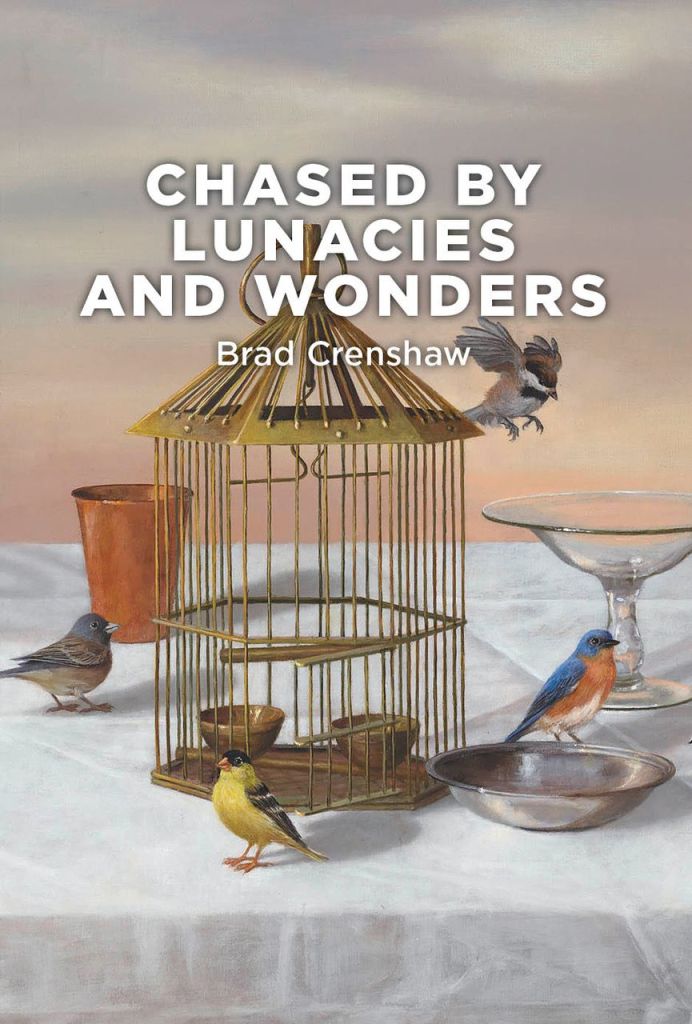
 Woodblock Print by Annie Bissett
Woodblock Print by Annie Bissett






